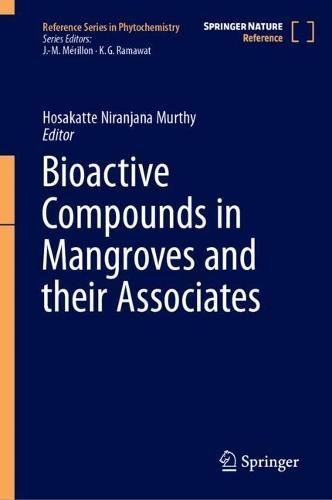Overview
This reference work offers a comprehensive overview of the chemistry and bioactivity of mangrove ecosystems, focusing on their specialized metabolites and biological activities. Through this volume, readers will discover the novel secondary metabolites from mangrove flora and their potential applications in various fields. The chapters cover a wide range of topics, including the phytochemistry and biological activities of specific mangrove species such as Acanthus ilicifolius, Avicennia marina, and Rhizophora mucronata. The chapter authors present an expert analysis of the bioactive compounds found in these species, exploring their pharmacological and toxicological properties. Particular attention is given to the anticancer activities of certain compounds, as well as the role of mangrove-associated bacteria and fungi in health management and bioremediation. Readers will also encounter discussions on the synthesis of nanomaterials from mangroves and their antimicrobial properties. This book is an essential resource for researchers, scholars, and practitioners in the fields of botany, pharmacology, and environmental science. It invites readers to think through critical questions about the ecological and medicinal significance of mangroves, offering diverse perspectives from expert contributors.
Full Product Details
Author: Hosakatte Niranjana Murthy
Publisher: Springer International Publishing AG
Imprint: Springer International Publishing AG
ISBN: 9783031910654
ISBN 10: 3031910656
Pages: 687
Publication Date: 17 September 2025
Audience:
Professional and scholarly
,
Professional & Vocational
Format: Hardback
Publisher's Status: Forthcoming
Availability: Not yet available

This item is yet to be released. You can pre-order this item and we will dispatch it to you upon its release.
Author Information
Hosakatte Niranjana Murthy is a Professor in the Post-Graduate Department of Botany, Karnatak University, Dharwad, India, and he is also a Professor at the KLE Technological University, Hubballi, India. He has a tremendous passion for research and academics. Since, 1986, Prof. Murthy has served in various positions in the Post-Graduate Department of Botany, at Karnatak University, Dharwad, India. Apart from teaching experience in the area of plant biotechnology. Prof. Murthy has post-doctoral and collaborative research experience in many foreign research institutes. He worked at Biotechnology Division, Tata Energy Research Institute, New Delhi, India (1992); Crop Science Department, University of Guelph, Guelph, Canada (1993); Research Centre for the Development of Horticultural Technology, Chungbuk National University, Cheongju, South Korea (2000-2001; 2002, 2004, 2006-2007, 2013-2014; 2022-2024); and Department of Biological Sciences, University of Nottingham, Nottingham, United Kingdom (2005-2006) as a post-doctoral fellow/visiting scientist. Prof. Murthy is the recipient of various prestigious fellowships including Biotechnology National Associate and Biotechnology Overseas Associate (awarded by the Department of Biotechnology, Ministry of Science and Technology, Government of India), Brian Pool Fellowship (awarded by Korean Society of Science and Technology, South Korea), visiting fellowship (awarded by Korean Science and Engineering Foundation, South Korea), Commonwealth Post-doctoral Fellowship (awarded by Korean Association of Commonwealth Universities, UK). He has completed more than 15 research projects funded by various agencies and supervised 22 Ph.D. students Prof. Murthy has published 285 research articles in international peer-reviewed journals with high impact factors. His research has been cited more than 6500 times by fellow researchers and his H-index (Hirsch Index) of 42 as recorded by Scopus. Prof. Murthy has developed biotechnological methods for the production of pharmaceutically important secondary metabolites from cell and organ cultures of ginseng, Siberian ginseng, Echinacea, and St. John's wort using large-scale bioreactors along with South Korean collaborators. His experimental investigations on the use of adventitious root cultures in bioreactor technologies for the production of biomass and secondary metabolites have paved the way for the commercialization of plant-based pharmaceuticals and nutraceuticals.



